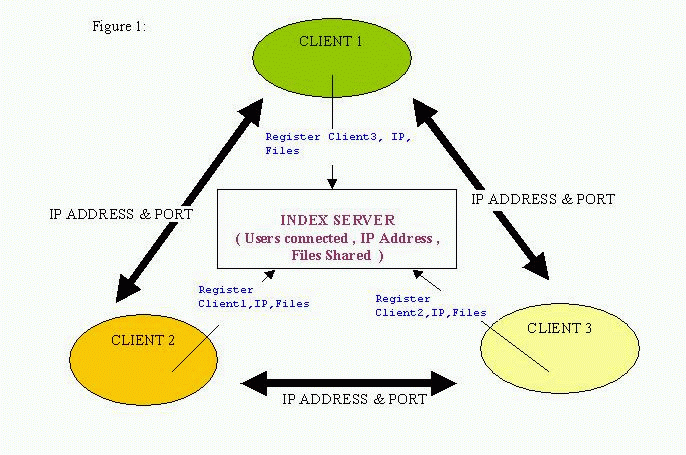盡管有許多P2P網絡不需要索引服務器或中央服務器,各客戶機之間可以互相直接通訊,但下面的圖1還是顯示了P2P網絡的基本工作原理,一般來說,P2P概念中包含一台中央索引服務器,這台服務器並不存儲有任何文件,它只存儲有登錄到該網絡上的所有用戶的信息、客戶端的IP地址以及用戶提供的供共享的文件,客戶機和服務器使用簡單的命令通過報路連接進行通訊。
當客戶端A想要查找P2P網絡上其他客戶端提供共享的文件時,系統會執行下面的操作:
·客戶端A以自己的用戶名登錄到索引服務器上。
·客戶端A向服務器注冊自己想提供給其他用戶共享的文件,以便其他用戶能夠查找到這些文件。
·客戶端A向服務器發出申請,查找與一定的輸入模式相匹配的文件。
·索引服務器在其數據庫中搜索給定的文件名,並將搜索到的如下的結果返回給客戶端A:
·提供該文件的客戶端,例如客戶端B。
·該用戶的IP地址。
·它搜索到的文件名。
一旦客戶端A選擇了下載選項,客戶端A就使用搜索返回的IP地址與客戶端B建立連接。
·一旦成功地建立起一個連接,就可以通知對方開始發送文件了。
·下載完成後,應當向索引服務器注冊你得到的共享文件的拷貝。
這樣的P2P網絡可以用來共享任何類型的文件,它既可以用在局域網上,也可以作在互聯網上。

(圖1)
C#語言由於其對網絡功能良好的支持,特別是內置地支持TCPListener和TCPClient這二個類,使得利用它開發P2P應用程序變得非常容易。下面就是一個使用C#開發的P2P應用的例子:
1 public MyTcpListener(int port) : base(port)
public MyTcpListener(int port) : base(port)
2
3 public void StopMe()
public void StopMe()
4

 {
{
5 if ( this.Server != null )
if ( this.Server != null )
6
7 }
}
8 }
}
9
10 public class Transfer
public class Transfer
11

 {
{
12 MyTcpListener tcpl;
MyTcpListener tcpl;
13
14 public Transfer()
public Transfer()
15

 {
{
16 OptionsLoader ol = new OptionsLoader();
OptionsLoader ol = new OptionsLoader();
17 int port = 8081;
int port = 8081;
18 if (ol.Port > 0)
if (ol.Port > 0)
19

 {
{
20 port = ol.Port;
port = ol.Port;
21 }
}
22 else
else
23

 {
{
24 port = 8081;
port = 8081;
25 }
}
26
27 this.tcpl = new MyTcpListener(port);
this.tcpl = new MyTcpListener(port);
28 }
}
29
30 public void TransferShutdown()
public void TransferShutdown()
31
32
33 public void ListenForPeers()
public void ListenForPeers()
34

 {
{
35 try
try
36

 {
{
37
38 Encoding ASCII = Encoding.ASCII;
Encoding ASCII = Encoding.ASCII;
39
40
41 tcpl.Start();
tcpl.Start();
42
43
44 while (true)
while (true)
45

 {
{
46 // 在有連接之前,Accept將處於阻塞狀態
// 在有連接之前,Accept將處於阻塞狀態
47 Socket s = tcpl.AcceptSocket();
Socket s = tcpl.AcceptSocket();
48 NetworkStream DataStream = new NetworkStream(s);
NetworkStream DataStream = new NetworkStream(s);
49
50 String filename;
String filename;
51 Byte[] Buffer = new Byte[256];
Byte[] Buffer = new Byte[256];
52 DataStream.Read(Buffer, 0, 256);
DataStream.Read(Buffer, 0, 256);
53 filename = Encoding.ASCII.GetString(Buffer);
filename = Encoding.ASCII.GetString(Buffer);
54 StringBuilder sbFileName = new StringBuilder(filename);
StringBuilder sbFileName = new StringBuilder(filename);
55 StringBuilder sbFileName2 = sbFileName.Replace("", "");
StringBuilder sbFileName2 = sbFileName.Replace("", "");
56 FileStream fs = new FileStream(sbFileName2.ToString(), FileMode.Open, FileAccess.Read);
FileStream fs = new FileStream(sbFileName2.ToString(), FileMode.Open, FileAccess.Read);
57 BinaryReader reader = new BinaryReader(fs);
BinaryReader reader = new BinaryReader(fs);
58 byte[] bytes = new byte[1024];
byte[] bytes = new byte[1024];
59 int read;
int read;
60 while((read = reader.Read(bytes, 0, bytes.Length)) != 0)
while((read = reader.Read(bytes, 0, bytes.Length)) != 0)
61

 {
{
62 DataStream.Write(bytes, 0, read);
DataStream.Write(bytes, 0, read);
63 }
}
64 reader.Close();
reader.Close();
65 DataStream.Flush();
DataStream.Flush();
66 DataStream.Close();
DataStream.Close();
67 }
}
68 }
}
69 catch(SocketException ex)
catch(SocketException ex)
70

 {
{
71 MessageBox.Show(ex.ToString());
MessageBox.Show(ex.ToString());
72 }
}
73 }
}
74
75 public void DownloadToClient(String server, string remotefilename, string localfilename)
public void DownloadToClient(String server, string remotefilename, string localfilename)
76

 {
{
77 try
try
78

 {
{
79 TcpClient tcpc = new TcpClient();
TcpClient tcpc = new TcpClient();
80 Byte[] read = new Byte[1024];
Byte[] read = new Byte[1024];
81
82 OptionsLoader ol = new OptionsLoader();
OptionsLoader ol = new OptionsLoader();
83 int port = 0;
int port = 0;
84 if (ol.Port > 0)
if (ol.Port > 0)
85

 {
{
86 port = ol.Port;
port = ol.Port;
87 }
}
88 else
else
89

 {
{
90 // 缺省的端口號,可以設置為使用的端口號
// 缺省的端口號,可以設置為使用的端口號
91 port = 8081;
port = 8081;
92 }
}
93
94
95 // 嘗試與服務器連接
// 嘗試與服務器連接
96 IPHostEntry IPHost = Dns.Resolve(server);
IPHostEntry IPHost = Dns.Resolve(server);
97 string []aliases = IPHost.Aliases;
string []aliases = IPHost.Aliases;
98 IPAddress[] addr = IPHost.AddressList;
IPAddress[] addr = IPHost.AddressList;
99
100 IPEndPoint ep = new IPEndPoint(addr[0], port);
IPEndPoint ep = new IPEndPoint(addr[0], port);
101 tcpc.Connect(ep);
tcpc.Connect(ep);
102
103 // 獲得流對象
// 獲得流對象
104 Stream s = tcpc.GetStream();
Stream s = tcpc.GetStream();
105 Byte[] b = Encoding.ASCII.GetBytes(remotefilename.ToCharArray());
Byte[] b = Encoding.ASCII.GetBytes(remotefilename.ToCharArray());
106 s.Write( b, 0, b.Length );
s.Write( b, 0, b.Length );
107 int bytes;
int bytes;
108 FileStream fs = new FileStream(localfilename, FileMode.OpenOrCreate);
FileStream fs = new FileStream(localfilename, FileMode.OpenOrCreate);
109 BinaryWriter w = new BinaryWriter(fs);
BinaryWriter w = new BinaryWriter(fs);
110
111 // 讀取流對象,並將其轉換為ASCII碼
// 讀取流對象,並將其轉換為ASCII碼
112 while( (bytes = s.Read(read, 0, read.Length)) != 0)
while( (bytes = s.Read(read, 0, read.Length)) != 0)
113

 {
{
114 w.Write(read, 0, bytes);
w.Write(read, 0, bytes);
115 read = new Byte[1024];
read = new Byte[1024];
116 }
}
117
118 tcpc.Close();
tcpc.Close();
119 w.Close();
w.Close();
120 fs.Close();
fs.Close();
121 }
}
122 catch(Exception ex)
catch(Exception ex)
123

 {
{
124 throw new Exception(ex.ToString());
throw new Exception(ex.ToString());
125 }
}
126 }
}
127 }
}
128 }
}
129